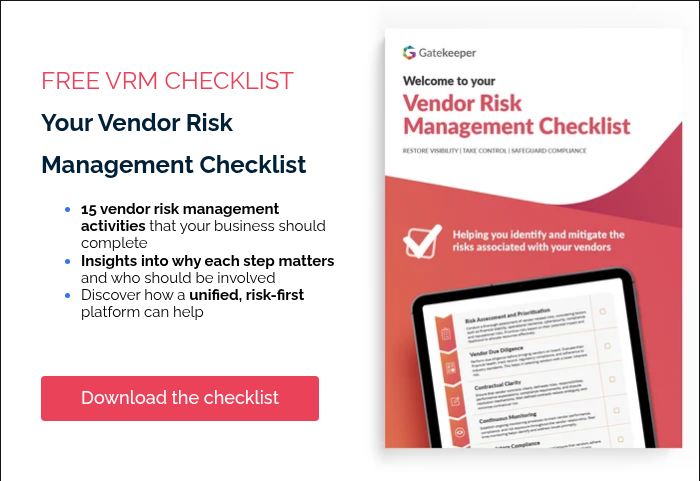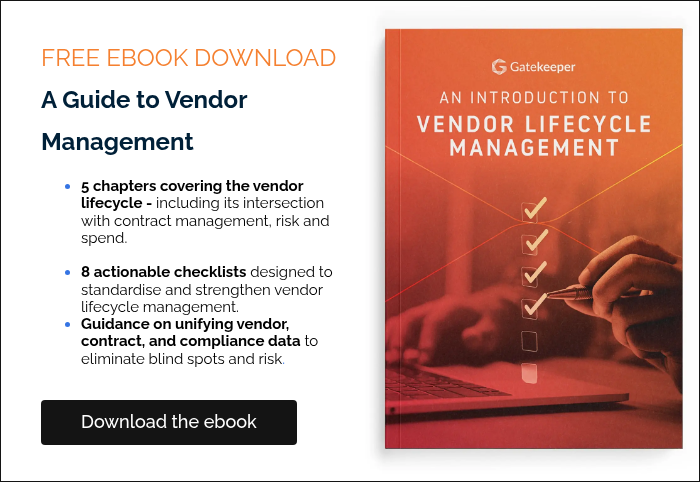
The key factor in such a decision is the vendor’s ability and willingness to remediate or mitigate any identified risks to your business.
This article discusses an approach commonly used to create vendor due diligence questionnaires, covering:

Benefits for your business:
Benefits for your vendors
You should perform some level of due diligence on every vendor you contract with.
The extent of that effort should be based on:
Minimal due diligence might be enough for a low-cost office supplies vendor. However, a thorough assessment is crucial for a vendor managing your sensitive data, providing critical infrastructure services, or accessing your internal technology infrastructure to install or administer software.
A simple low-medium-high scale can rank a vendor’s position for each factor. Most of your vendors will require minimal due diligence, a few will need moderate effort, and strategic vendors will need thorough and more frequent reviews.
It's advisable to have a basic vendor due diligence questionnaire that describes the essential data to be obtained from and any that might need to be provided to, your existing and potential vendors.
This can be supplemented with extensions for more in-depth data collection when needed for the few essential vendors you rely on.
Timing for due diligence activities can be:
Ensure your vendor contracts include an obligation to comply with reasonable requests for their participation in the due diligence process.

Building an effective and productive questionnaire can take a lot of insight. To inform your decision to begin or continue using a vendor, you need certainty that the requested data will provide a sufficient understanding of the vendor’s risk management approach and outcomes.
This can be achieved by involving subject matter experts from departments like Finance, IT and Legal, who have deep knowledge of the different types of risk facing their specific areas.
These people are best suited to assess returned vendor data for red flags. It's smart to use their expertise to determine the data needed from vendors and set up red flag indicators.
These experts can also assess available vendor due diligence questionnaires or those from industry bodies and associations, and propose any useful elements for inclusion.
For both existing and potential vendors, common essential due diligence areas include:
Relies on vendor processes and documentation:
Requires comprehensive documentation:
Requires comprehensive documentation:
Your questionnaire must be kept relevant in the face of change drivers such as:
Schedule periodic reviews of your vendor due diligence questionnaire to ensure it remains relevant and addresses current risks. Incorporate changes based on regulatory updates, industry trends, and lessons learned from past vendor assessments.
Vendor and Contract Lifecycle Management software like Gatekeeper can significantly streamline and enhance the vendor due diligence process, including questionnaire setup and monitoring. Here’s how:
Vendor Due Diligence Questionnaire Setup
Questionnaire Distribution and Monitoring
Additional benefits for the due diligence process
By leveraging Gatekeeper's capabilities, your business can significantly improve the efficiency, accuracy, and consistency of its vendor due diligence processes. The software empowers you to make informed decisions about vendor selection and management while reducing the risk of disruptions and financial losses.
An effective vendor due diligence questionnaire is crucial for managing vendor-related risks and ensuring compliance with regulatory and industry standards. It provides clarity, consistency, and comprehensive data collection, benefitting both your business and its vendors.
Regular reviews and updates keep the questionnaire relevant in an evolving risk landscape. By using it, you can make informed decisions about starting or restarting, continuing, or terminating relationships with vendors, ultimately supporting your business’s risk management and operational resilience.
To get more information about how Gatekeeper can help with your Vendor Due Diligence activities, don't hesitate to get in touch with us.

Rod is a seasoned Contracts Management and Procurement professional with a senior IT Management background, specialising in ICT contracts